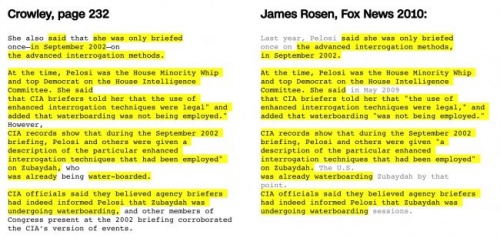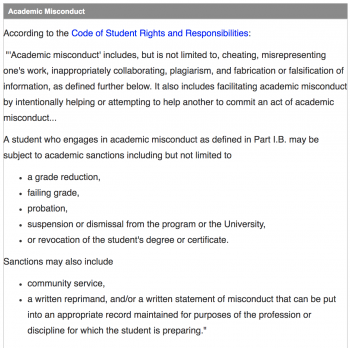Difference between revisions of "Plagiarism"
| Line 14: | Line 14: | ||
===Melania Trump Plagiarism Controversy=== | ===Melania Trump Plagiarism Controversy=== | ||
| − | The current First Lady of the United States of America Melania Trump gave a speech during the Republican National Convention on July 18, 2016 that incorporated themes of inclusivity, honesty, and hard work.<ref>2016, July 19. US election: Melania Trump 'plagiarised' Michelle Obama. BBC News. https://www.bbc.com/news/election-us-2016-36832095</ref> Even though her speech immediately resonated with the audience at the convention, later skepticisms raised arguments that Melania’s speech bore strong resemblance to the speech given by previous First Lady Michelle Obama back in 2003. | + | The current First Lady of the United States of America Melania Trump gave a speech during the Republican National Convention on July 18, 2016 that incorporated themes of inclusivity, honesty, and hard work.<ref>2016, July 19. US election: Melania Trump 'plagiarised' Michelle Obama. BBC News. https://www.bbc.com/news/election-us-2016-36832095</ref> Even though her speech immediately resonated with the audience at the convention, later skepticisms raised arguments that Melania’s speech bore strong resemblance to the speech given by previous First Lady Michelle Obama back in 2003. <br /> |
| + | <br /> | ||
| + | According to one investigation done by news channel MSNBC, one passage from Melania Trump’s speech was 84% similar to the parallel passage in Michelle Obama’s speech.<ref>MSNBC. (2016, July 19). Lawrence: Melania Trump's Passage 'Pure Plagiarism' of Michelle Obama. Retrieved from: https://www.youtube.com/watch?v=a1xxm2aaEew</ref> From a report generated by an internet-based plagiarism detection service, a piece of work that is above 25% similar to a source material is deemed highly probable of plagiarism.<ref>(2013, September). Interpreting Turnitin Originality Reports. Retrieved from: https://eat.scm.tees.ac.uk/bb8content/resources/recipes/interpretTurnitin.pdf</ref> | ||
| + | |||
== Evolution of Plagiarism == | == Evolution of Plagiarism == | ||
Revision as of 23:36, 9 April 2019
Plagiarism is the act of improperly incorporating existing work either without authorization or without documentation, or both.[1]. The use of another’s words, images, videos, or music without appropriate citation or acknowledgment is considered plagiarism. It is not a crime to plagiarize, but it can lead to copyright infringement, a legally punishable offense. [2] Plagiarism is often prevalent in politics and has evolved greatly over time with the advancements in technology and the internet. Academic and industrial institutions consider plagiarism a serious ethical violation that often ends in punishment deemed appropriate by said institutions. [3]
Contents
Types of Plagiarism

Plagiarism can come in many forms, whether it be purposeful or accidental. It can happen at work, at school, and more commonly today, on the Internet. Legal measures for these actions are regarded in the context and intent the work was produced. It is recommended to avoid these situations entirely or make use of proper usage and citation techniques.[5]
- Written Work: representing someone else’s work as your own, copying another’s thoughts and words without appropriate citation, forgetting to use quotation marks, giving false information about the source, using the same sentence structure but altering words.[5]
- Music: using another’s copyrighted music in your own work, playing a cover using copyrighted music, creating music that borrows heavily from copyrighted work. [5]
- Images/Videos: using videos and images in one’s own work without proper citation, recreating images or videos in the same likeliness of another’s work, altering another’s videos or images without citation.[5]
- Self-plagiarism: reusing one’s own words or ideas that were previously published in another context without proper citation.[6]
Plagiarism and Politics
While plagiarism comes in many different forms, one area that has been the focus of plagiarism lately has been politics. In American politics we have seen candidates plagiarise speeches, books, and reports. One examples comes from Montana Senator John Walsh, who was found that graduate school papers had been plagiarized. These events lead for the senator to withdraw from his reelection campaign [7]. We have also seen plagiarism in other countries politics, such as, Russia plagiarizing Putin's economic reports, and Hungarian 2010-1012 president was found to have plagiarized his 1992 dissertation.
Melania Trump Plagiarism Controversy
The current First Lady of the United States of America Melania Trump gave a speech during the Republican National Convention on July 18, 2016 that incorporated themes of inclusivity, honesty, and hard work.[8] Even though her speech immediately resonated with the audience at the convention, later skepticisms raised arguments that Melania’s speech bore strong resemblance to the speech given by previous First Lady Michelle Obama back in 2003.
According to one investigation done by news channel MSNBC, one passage from Melania Trump’s speech was 84% similar to the parallel passage in Michelle Obama’s speech.[9] From a report generated by an internet-based plagiarism detection service, a piece of work that is above 25% similar to a source material is deemed highly probable of plagiarism.[10]
Evolution of Plagiarism
The first instance of ‘literary theft’ stems back to 40 AD. The Roman poet Martial used the Latin word plagiarus, literally meaning ‘kidnapper,’ in one of his poems to describe someone who was stealing his work. It wasn’t until 1601, during the Age of Enlightenment, that playwright Ben Johnson introduced a derivative of the word, plagiary, in English. [11] During this era, original works increased in value also increasing the occurrence and acknowledgement of plagiarism.
The first copyright law in existence was the Statute of Anne in England in 1710, recognizing copyright as an author’s right. Author’s could register their work to be protected by the government for a limited period of time. [12] The United States followed suit in 1790, passing their own copyright law modeled off the Statute of Anne, protecting maps, charts, and books for a fourteen year period. Overtime, many amendments were made to the act, broadening the range of works that were protected and for how long. [13] The Copyright Act of 1976, still employed today, provides copyright protection to all published and unpublished works so long as they are in tangible form[14]. These acts influenced academic and industrial institutions to build their own standards for recognizing and addressing acts of plagiarism overtime.
The introduction of the World Wide Web has drastically changed the way information is received and perceived. With these changes, a large gray area has formed over the use of this information and the modes in which it is transferred. In an effort to govern online infringement, Congress passed the Digital Millennium Copyright Act (DMCA) in 1998.[15] This act “makes it illegal to circumvent technological measures used to prevent unauthorized access to or copying of copyrighted works, particularly books, movies, videos, video games, and computer programs.” [16] Filing a DMCA takedown notice can help remove infringing material online, but there are currently no regulations regarding the sharing of online content as policies are still evolving in response to new technologies.[17][18]
Legal Implementations
Plagiarism can be considered theft or even fraud in some contexts, but it is not a criminal or civil offense. [19] Legal consequence can occur if it infringes on an author’s intellectual property rights, which are outlined by the United States Constitution - “to promote the Progress of Science and useful Arts, by securing for limited Times to Authors and Inventors the exclusive Right to their respective Writings and Discoveries."[20] Plagiarism and copyright infringement are not the same, despite both referring to a similar act. “Copyright infringement occurs when a copyrighted work is reproduced, distributed, performed, publicly displayed, or made into a derivative work without the permission of the copyright owner.” [21] Plagiarism also differs from copyright infringements in the fact that copyright violations go against the rights of the copyright holder, when the copyrighted material is used without consent. Plagiarism is more of an ethical construct, concerned with giving appropriate credit where it is rightfully earned.
A Matter of Ethics
Plagiarism in academic and corporate institutions is not a matter that is taken lightly and most often results in penalty, suspension, or expulsion. It is considered theft and strips the rightful author of any accolade for their work. Plagiarized work gives a false representation of the knowledge and abilities of the author. [23] Garnering achievements and promotions for ideas that aren’t your own could be a risk to others in educational or corporate environments, thus the reason for the serious consequence. The Internet has introduced a large gray area causing confusion about what is ethical when accessing content online.[24] The increasing volume of unauthorized content so easily available has decreased the level of regard for copyright and intellectual property. The lack of tangibility increases the ease of reproducibility, making information hard to safeguard and keep to one’s self.[25] The accessibility of information via a computer screen makes it easier for users to subside feelings of empathy for the actions they take.[17] Streaming, sharing, and downloading has become a Digital Age norm, where users don’t think twice about the owner of the content.[17] There is little to no repercussion or regulation of the sharing of online content at this point in time as policies are still evolving in response to new technologies.[17] This does not change the ethical violation that this act causes as it still involves using content created by someone else.
Sources
- ↑ Snapper, John., 2008. "The Matter of Plagiarism: What, Why, and If", The Handbook of Information and Computer Ethics, pg. 533
- ↑ Wikipedia: Copyright Infringement. (2002). https://en.wikipedia.org/wiki/Copyright_infringement
- ↑ Imran, N. (2010). Electronic media, creativity and plagiarism. ACM SIGCAS Computers and Society, 40(4), pp.25-44.
- ↑ Kaczynski, A. (2017). Trump national security pick Monica Crowley plagiarized multiple sources in 2012 book. CNN Money. https://money.cnn.com/interactive/news/kfile-trump-monica-crowley-plagiarized-multiple-sources-2012-book/index.html
- ↑ 5.0 5.1 5.2 5.3 What is Plagiarism? (2017). Turnitin, LLC. https://www.plagiarism.org/article/what-is-plagiarism
- ↑ Mudrak, B. (2019). Self-Plagiarism: How to Define it and Why You Should Avoid It. American Journal Experts. https://www.aje.com/arc/self-plagiarism-how-to-define-it-and-why-to-avoid-it/
- ↑ Fawxy, F(2016). From speeches to Ph.D.'s: Politicians called out for copying. CNN. https://www.cnn.com/2016/07/19/politics/politicians-plagiarism/index.html
- ↑ 2016, July 19. US election: Melania Trump 'plagiarised' Michelle Obama. BBC News. https://www.bbc.com/news/election-us-2016-36832095
- ↑ MSNBC. (2016, July 19). Lawrence: Melania Trump's Passage 'Pure Plagiarism' of Michelle Obama. Retrieved from: https://www.youtube.com/watch?v=a1xxm2aaEew
- ↑ (2013, September). Interpreting Turnitin Originality Reports. Retrieved from: https://eat.scm.tees.ac.uk/bb8content/resources/recipes/interpretTurnitin.pdf
- ↑ Bailey, J. (2011). The World's First Plagiarism Case. Plagiarism Today. https://www.plagiarismtoday.com/2011/10/04/the-world%E2%80%99s-first-plagiarism-case/
- ↑ Statute of Anne. (n.d.). Encyclopædia Britannica. https://www.britannica.com/topic/Statute-of-Anne
- ↑ Congress Passes the First Copyright Act. (n.d). U.S. Copyright Office. https://www.copyright.gov/timeline/timeline_18th_century.html
- ↑ Congress Passes the Current Copyright Act. (n.d.). U.S. Copyright Office. https://www.copyright.gov/timeline/timeline_1950-1997.html
- ↑ Wikipedia: Digital Millennium Copyright Act. (2002). https://en.wikipedia.org/wiki/Copyright_infringement
- ↑ Congress Passes the Digital Millennium Copyright Act. (n.d.). U.S. Copyright Office. https://www.copyright.gov/timeline/timeline_1998-2012.html
- ↑ 17.0 17.1 17.2 17.3 Ethics and Intellectual Property. MediaSmarts, 2014. http://mediasmarts.ca/digital-media-literacy/digital-issues/online-ethics/ethics-intellectual-property.
- ↑ What is a DMCA Takedown? (2019). Digital Millennium Copyright Act Services Ltd. https://www.dmca.com/faq/What-is-a-DMCA-Takedown
- ↑ Morrow, S. (n.d.). Plagiarism: What is it, Exactly? LegalZoom.com. https://www.legalzoom.com/articles/plagiarism-what-is-it-exactly
- ↑ U.S. Constitution. Article I, Section 8, Clause 8. (n.d.). http://constitutionus.com/
- ↑ Definitions: What is Copyright Infringement? (n.d). U.S. Copyright Office. https://www.copyright.gov/help/faq/faq-definitions.html
- ↑ Plagiarism: Consequences of plagiarism. (n.d.). Code of Academic Misconduct. University of Utah http://campusguides.lib.utah.edu/c.php?g=237735&p=1585547
- ↑ What Makes Plagiarism a Serious Offense? (2016). MLA Handbook, 8th ed. https://style.mla.org/plagiarism-and-academic-dishonesty/
- ↑ Steeves, Valerie. Young Canadians in a Wired World, Phase III: Experts or Amateurs? Gauging Young Canadians’ Digital Literacy Skills. MediaSmarts, 2014. http://mediasmarts.ca/ycww/experts-or-amateurs-gauging-young-canadians-digital-literacy-skills.
- ↑ Mason, Richard. (1986). Four Ethical Issues of the Information Age. MIS Quarterly. Vol. 10. No.1. https://www.researchgate.net/publication/242705009_Four_Ethical_Issues_of_the_Information_Age